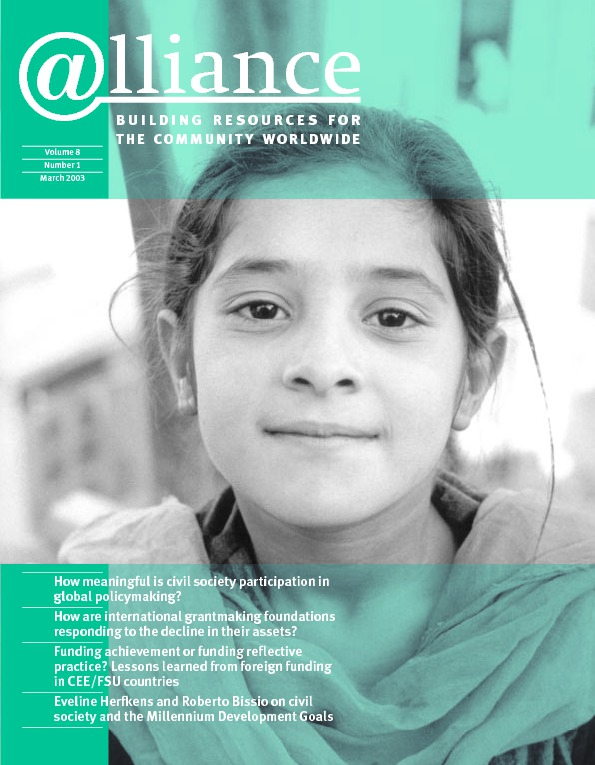There are perhaps no meetings that potentially affect so many people’s lives as the annual meetings of the world’s most powerful nations, the G8, so FIM’s latest project is a challenging one. In late 2001, following discussions with the Ford Foundation, FIM agreed to undertake a project with the aim of helping to develop dialogue between global civil society and the G8.
The FIM Board specified several conditions before approving the project, including:
- FIM is a non-representative body and would not present itself as a gatekeeper of global civil society.
- FIM would concentrate on the means of improving the process rather than the content of dialogue between civil society and the G8.
- Opening up dialogue with the G8 would not in any way be construed as conferring legitimacy upon the G8 as a global governance mechanism.
One of the difficulties facing FIM was that there is no permanent G8 secretariat to deal with. The agenda is determined each year by the host country. After three months of negotiations between FIM and the host government, Canada, a meeting was finally fixed. The G8 would be represented by the Canadian host Sherpa to the G8, the French Ambassador to Canada, the British High Commissioner and two representatives from the Japanese Embassy. FIM invited 15 participants from around the world, with a majority from the South.
Before the three-hour meeting in Ottawa on 23 May 2002, the 15 civil society participants met for two full days in Montreal to prepare themselves. It was up to the FIM delegation to decide the agenda for the Ottawa meeting, and they chose to focus on NEPAD, the global democratic deficit, and how to strengthen dialogue between civil society and the G8 in future.
Although the G8 team made no concrete commitments in any of these areas, overall the outcome of the meeting was positive. The G8 representatives clearly felt the FIM model, with a discreet, not too large meeting, worked for them. There was mutual agreement that there should be a post-Summit post mortem meeting with civil society, the French expressed their interest in consulting with civil society leading up to the 2003 G8, to be held in Evian, and the Canadians offered to pass on to the French their experiences of dealing with the FIM delegation.
With a positive first encounter in Ottawa and a French government that seems keen to cooperate much more closely with French civil society than it has done in the past in order to counter the hegemony of America, the prospects for more productive engagement around the 2003 G8 meeting seem good.
For more information see http://www.fimcivilsociety.org or contact the FIM secretariat at info@fimcivilsociety.org
What is Forum International de Montréal (FIM)?
Established in 1998, FIM is a global alliance of individuals and organizations whose goal is to increase the influence of international civil society on the UN and the multilateral system. By the late 1990s the number of NGOs in consultative status with ECOSOC (UN Economic and Social Council) was approaching 2,000 and it was feared that representation had become too diffuse and that the UN bodies would in effect be able to pick and choose which voices they listened to. A feasibility study carried out by an informal advisory group that eventually became the interim board of FIM suggested that a new, non-representative body could play a valuable role here.
FIM is committed to three different activities in pursuit of its mission:
- an annual forum to look at the major challenges facing civil society in the international arena in the coming year;
- a triannual conference on global governance;
- the G8 initiative.
FIM’s constitution stipulates that a majority of board members must be from the South.
See http://www.fimcivilsociety.org
Civil society in support of Millennium Development Goals
‘If there is any point in having a peoples’ movement in support of the United Nations, then it must be to support the alleviation of extreme poverty and HIV/AIDS, while at the same time promoting sustainable development, human rights and the prevention of armed conflict,’ said Sirpa Pietikäinen, the Finnish Chair of the Executive Committee of the World Federation of United Nations Associations (WFUNA).
WFUNA has a global network of member UN Associations in over 100 countries around the world committed to supporting the principles and programmes of the UN. In its recent report, We the Peoples: A Call to Action for the UN Millennium Declaration, which was based on an electronic survey of over 5,000 civil society organizations, WFUNA showcases how the emerging global civil society is working with the UN to achieve the Millennium Development Goals (MDGs). Building on this initiative, WFUNA has created an online listserv for MDG campaign news and is facilitating monthly meetings at the UN in New York to enable information sharing on campaign strategies among civil society, UN officials, governments and interested others.
See the We the Peoples report at http://www.wfuna.org
To join the listserve, send an email to mdgcampaign-subscribe@yahoogroups.com





Comments (0)